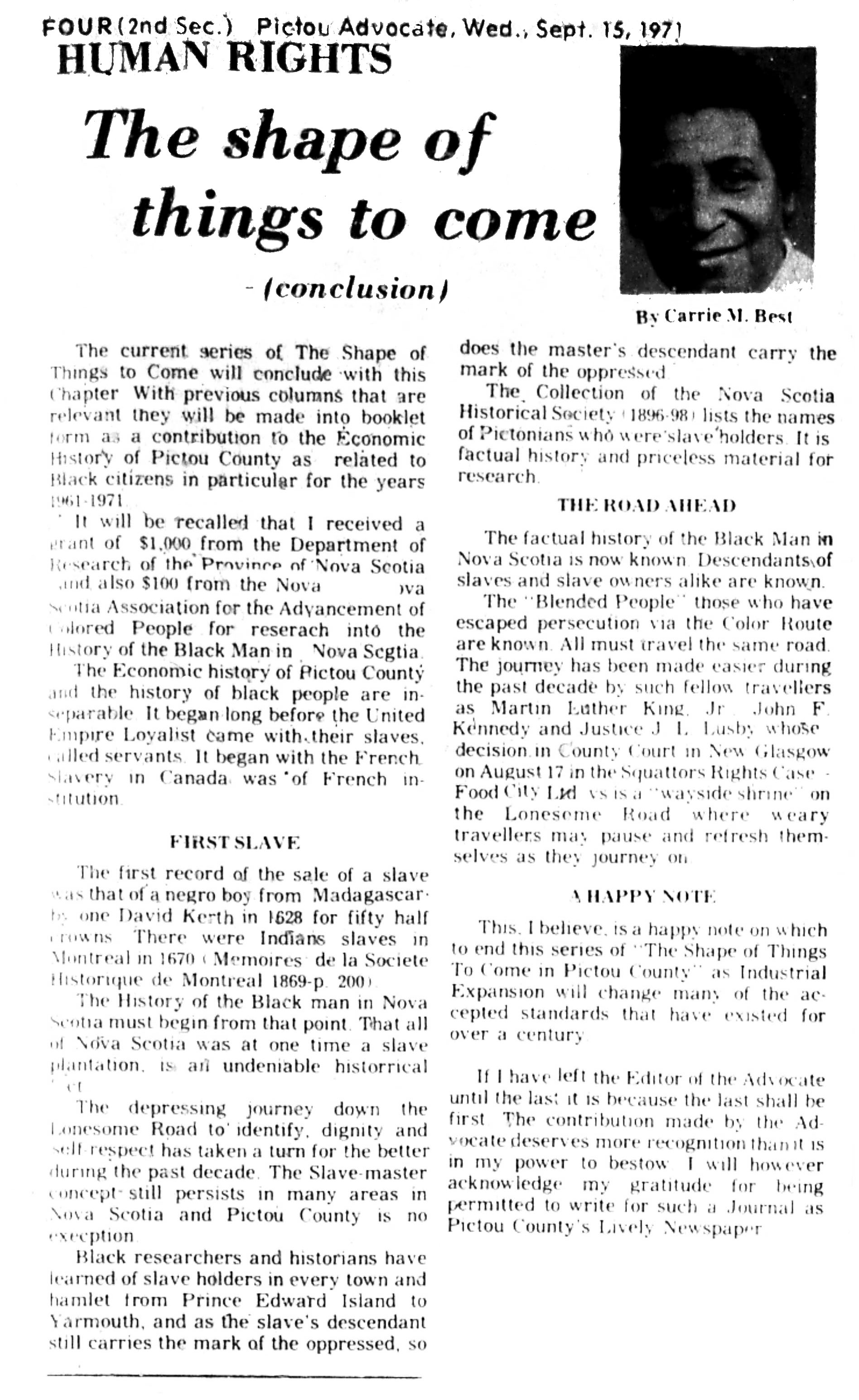
Human Rights
The shape of things to come (conclusion)
The current series of The Shape of Things to Come will conclude with this Chapter. With previous columns that re relevant they will be made into booklet form as a contribution to the Economic History of Pictou County as related to Black citizens in particular for the years 1961-1971.
It will be recalled that I received a grant of $1,000 from the Department of Research of the Province of Nova Scotia and also $100 from the Nova Scotia Association for the Advancement of Colored People for research into the History of the Black Man in Nova Scotia.
The Economic history of Pictou County and the history of black people are inseparable. It began long before the United Empire Loyalists came with their slaves, called servants. It began with the French. Slavery in Canada was of French institution.
First Slave
The first record of the sale of a slave was that of a negro boy from Madagascar to one David Kerth in 1628 for fifty half crowns. There were Indians slaves in Montreal in 1670 (Memoires de la Societe Historique de Montreal 1869 p200).
The History of the Black man in Nova Scotia must begin from that point. That all of Nova Scotia was at one time a slave plantation is an undeniable historical fact.
The depressing journey down the Lonesome Road to identify, dignity and self respect has taken a turn for the better during the past decade. The Slave-master concept still persists in many areas in Nova Scotia and Pictou County is no exception.
Black researchers and historians have learned of slave holders in every town and hamlet from Prince Edward Island to Yarmouth, and as the slave’s descendant still carries the mark of the oppressed, so does the master’s descendant carry the mark of the oppressed.
The Collection of the Nova Scotia Historical Society (1896-98) lists the names of Pictonians who were slave holders. It is factual history and priceless material for research.
The Road Ahead
The factual history of the Black Man in Nova Scotia is now knows. Descendants of slaves and slave owners alike are known.
The “Blended People” those who have escaped persecution via the Color Route are known. All must travel the same road. The journey has been made easier during the past decade by such fellow travellers as Martin Luther King Jr, John F Kennedy and Justice J L Lusby whose decision in County Court in New Glasgow on August 17 in the Squatters Rights Case – Food City Ltd vs is a “wayside shrine” on the Lonesome Road where weary travellers may pause and refresh themselves as they journey on.
A Happy Note
This I believe is a happy note on which to end this series of “The Shape of Things To Come in Pictou County” as Industrial Expansion will change many of the accepted standards that have existed for over a century.
If I have left the Editor of the Advocate until the last it is because the last shall be first. The contribution made by the Advocate deserves more recognition that is in my power to bestow. I will however acknowledge my gratitude for being permitted to write for such a Journal as Pictou County’s Lively Newspaper.
Carrie Mae Prevoe Best, founder of The Clarion newspaper was born in New Glasgow in 1903. She was an advocate for the fundamental rights of black, indigenous and all marginalized people.
Carrie Best wrote a column for the Pictou Advocate under the heading Human Rights from 1968 to 1975.
| File number: | PA15091971p4sec2 |
| Contributor: |
|
| Tags: | , Carrie Mae Prevoe Best, Carrie Best, human rights |
| Views: | 345 |
| Uploaded on: | November 19, 2021 |
| Source: | Pictou Advocate |